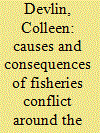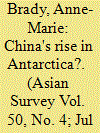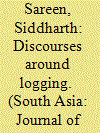|
|
|
Sort Order |
|
|
|
Items / Page
|
|
|
|
|
|
|
| Srl | Item |
| 1 |
ID:
189003


|
|
|
|
|
| Summary/Abstract |
Fisheries conflict is an underappreciated threat to the stability and health of communities. Declining fish populations, rising demand for seafood, and efforts to reduce illegal fishing are increasing the risk that conflict over fisheries resources will undermine stability and peace. Here, we investigate the frequency, causes, and consequences of fisheries conflict in six countries around the Horn of Africa and East Africa (Tanzania, Kenya, Somalia, Djibouti, Eritrea, and Yemen) between 1990 and 2017. Fisheries conflict events were cataloged from news reports, and events were characterized by the date, location, actors, consequences, and drivers of the conflict. We found the rate of fisheries conflict is gradually increasing in the region, with spikes in conflict driven by the arrival of foreign fishing boats or international naval vessels. Conflict was caused primarily by illegal fishing, foreign fishing, weak governance, limits on access to fishing grounds, and criminal activities including piracy. Two-thirds of all conflict events occurred in Kenyan and Somali waters, with areas of high conflict intensity in the Lake Victoria region, near the Somali coastline, and in the southern Red Sea. During this period, 684 fisheries conflict events in the region resulted in over 400 fatalities, nearly 500 injuries, and over 4,000 arrests.
|
|
|
|
|
|
|
|
|
|
|
|
|
|
|
|
| 2 |
ID:
098867


|
|
|
|
|
| Publication |
2010.
|
| Summary/Abstract |
China has begun a new phase in its Antarctic engagement. Beijing has dramatically increased Chinese scientific activities on the frozen continent and is looking to take on more of a leadership role there. This paper draws connections between China's expanded Antarctic program and debates on its foreign and domestic policies.
|
|
|
|
|
|
|
|
|
|
|
|
|
|
|
|
| 3 |
ID:
157095


|
|
|
|
|
| Summary/Abstract |
The indigenous Ho people of Jharkhand's West Singhbhum district have long coped with conflict over forests. Despite the importance wood holds for both marginalised and powerful actors, little is known about what determines informal logging locally. This ethnographic study of practices and discourses around logging in a central-eastern Indian forest division examines the views and roles of the actors and institutions involved in wood governance and logging politics. Going beyond tired accounts of state–community conflict and legal–illegal binaries, it addresses how wood extraction is framed locally, and demonstrates how logging is engendered and maintained by a local moral economy.
|
|
|
|
|
|
|
|
|
|
|
|
|
|
|
|
| 4 |
ID:
175391


|
|
|
|
|
| Summary/Abstract |
This article evaluates the impact of natural resource conflicts on Africa’s security. This study is qualitative and based on secondary data that were analysed textually. Hinged on the greed and grievance theory, the study argues that the mismanagement of resources, greed and grievance have had immeasurable negative implications on national security, national growth and development. The issues that have come to the fore in resource management in some selected African countries include rancorous intergroup relations, militancy, the proliferation of small arms and light weapons, leadership ineptitude, corruption, warlordism and money laundering. The article recommends that effective resource management strategies in Africa are key in curbing the plaguing security challenges and conflicts ensuing from resource ownership in the continent.
|
|
|
|
|
|
|
|
|
|
|
|
|
|
|
|
| 5 |
ID:
117017


|
|
|
|
|
| Publication |
2012.
|
| Summary/Abstract |
While a number of publications show that natural resources are associated with internal armed conflict, surprisingly little research looks at how natural resources affect post-conflict peace. This article therefore investigates the relationship between natural resources and post-conflict peace by analyzing new data on natural resource conflicts. We argue that the effect of natural resources on peace depends on how a country's natural resources can constitute a motive or opportunity for armed conflict. In particular, three mechanisms may link natural resources to conflict recurrence: disagreements over natural resource distribution may motivate rebellion; using natural resources as a funding source creates an opportunity for conflict; and natural resources may aggravate existing conflict, acting either as motivation or opportunity for rebellion, but through other mechanisms than distributional claims or funding. Our data code all internal armed conflicts between 1946 and 2006 according to the presence of these resource-conflict links. We claim such mechanisms increase the risk of conflict recurrence because access to natural resources is an especially valuable prize worth fighting for. We test our hypotheses using a piecewise exponential survival model and find that, bivariately, armed conflicts with any of these resource-conflict mechanisms are more likely to resume than non-resource conflicts. A multivariate analysis distinguishing between the three mechanisms reveals that this relationship is significant only for conflicts motivated by natural resource distribution issues. These findings are important for researchers and policymakers interested in overcoming the 'curse' associated with natural resources and suggest that the way forward lies in natural resource management policies carefully designed to address the specific resource-conflict links.
|
|
|
|
|
|
|
|
|
|
|
|
|
|
|
|
|
|
|
|
|